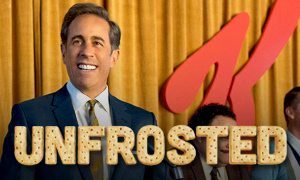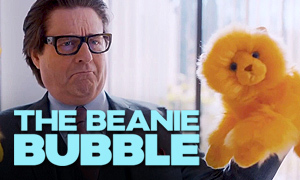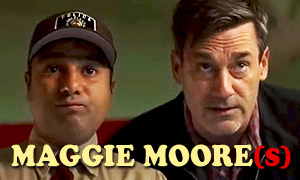Queenpins: History vs. Hollywood
How many women were involved in the real-life counterfeit coupon scheme?
The Queenpins true story reveals that there were three women involved in the real-life scheme, not two like in the movie. They were ringleader Robin Ramirez (46 at the time of her arrest), Marilyn Johnson (62), and Amiko "Amy" Fountain (42). The real Queenpins' mugshots are displayed below. The two women in the movie, Connie Kaminski (Kristen Bell) and JoJo Johnson (Kirby Howell-Baptiste), are not directly based on any of the real-life women.
Kristen Bell's character's background of being a former Olympic race walker who turns to couponing after having no luck getting pregnant (and spending tens of thousands on in vitro treatments) is fictional, as is Kirby Howell-Baptiste's character's unsuccessful efforts to make it as a vlogger.
Where did the women's counterfeit coupon operation take place?
The three real-life Coupon Queens carried out their counterfeit operation in Phoenix, Arizona where they lived. The ringleader, Robin Ramirez, started selling bogus coupons as far back as 2007, and was eventually joined by accomplices Marilyn Johnson and Amiko Fountain. -Coupons in the News
What type of counterfeit coupons did the women sell?
The three women, Robin Ramirez, Amiko Fountain, and Marilyn Johnson, mostly sold free-product coupons. They included coupons for anything from Hershey bars to dog food to diapers. "These aren't 50-cent-off coupons. These are free-item coupons," Phoenix Police Sgt. David Lake said. "For Iams, you get this coupon from her for $10 and you can get a $70 item... If you can get an unlimited number of those, think how this grows" (Yahoo Finance). The women sold their counterfeit coupons on various online sites, including eBay and their own website, SavvyShopperSite.com. The site's name was inspired by the legit coupon magazine Savvy Shopper, which is in no way related. The real-life Queenpins thought that the similar name would make their scheme appear more legitimate.
Did the real Queenpins live as flashy of lifestyles?
For the most part, yes. According to Sgt. David Lake, who was in charge of the coupon investigation at the Phoenix Police Department, "The opulence and the money was the equivalent of drug cartel-type stuff." In addition to the $40 million in counterfeit coupons that they confiscated, police seized $2 million in assets from the three women, including four homes, 22 guns, a 40-foot speed boat, and 21 vehicles. -JillCataldo.com
Did one of the women rent an airplane hangar to store her vehicles, off-road toys, and boat?
Yes. The Arizona coupon ring's leader, Robin Ramirez, rented an aircraft hangar to store her cars, 40-foot speedboat, luxury RV, and various off-road toys. The vehicles included a custom Corvette that was worth over $150,000. -Investigative Consultants
How did the real Queenpins obtain the fake coupons?
The true story behind Queenpins reveals that the women bought them in bulk overseas and then posted them for sale on sites like eBay and their own website, SavvyShopperSite.com, which is now defunct. "[Ringleader Robin Ramirez] would bring in these coupons from overseas in large quantities, quantities we never could imagine and she would sell them on her website for about 50 percent of face value," said Sgt. David Lake of the Phoenix Police Department.
"They are variations, reproductions of what were at one point legitimate coupons," said Bud Miller, an official with the Coupon Information Corporation (CIC). The real-life counterfeit operation was a bit less involved than the way the two women carry out their counterfeit coupon operation in the movie, persuading a married couple who work at a plant in Mexico to steal the paper and all of the coupon bar codes. Pictured below is a May 31, 2012 screenshot from the real-life Coupon Queens' website, SavvyShopperSite.com, showing some of the available coupons and their costs. The site's name is a play on the legit coupon magazine Savvy Shopper, which is in no way related. -DSA
Did the Coupon Queens' customers know they were buying counterfeit coupons?
While it's hard to know how many customers knew they might be engaging in criminal activity, there were a few red flags that should have at least made them suspicious. On the real Queenpins website, SavvyShopperSite.com, they sold free-product coupons, with the caveat that you must spend at least $50 on coupons per order. Savvy Shopper Site had a few other suspicious requirements. You could only place an order if you had a referral from a current customer, and you had to pay for your order with a Green Dot Moneypak (prepaid debit card). Perhaps the most telling sign that things weren't on the up-and-up was the fact that the site advised, "Please do not share this information with people that you don't actually know. This includes forums and any public viewing areas or websites."
Some of the site's customers were resellers, whom the site actively courted. The resellers would turn around and sell the counterfeit coupons on places like eBay. This allowed the coupons to get into the hands of a much wider array of shoppers. -JillCataldo.com
How was the women's counterfeit coupon enterprise exposed?
In researching the Queenpins true story, we learned that Procter & Gamble did an audit of their third-party coupon processors. It was then that they learned of the fakes that were in circulation. They joined forces with several other affected companies and hired private investigators to track the source of the fraudulent coupons. The trail led to the Arizona coupon ring located in Phoenix. -Daily Mail
Is Paul Walter Hauser's character in the movie, Ken Miller, inspired by a real person?
Paul Walter Hauser's character, Ken Miller, seems to be a very loosely-inspired caricature of Bud Miller, the Executive Director of the Coupon Information Corporation (CIC). Bud is a Certified Protection Professional (CPP) and an industry veteran. He has been commended by the FBI for supporting them in numerous efforts to fight "complex coupon fraud schemes." Bud played an instrumental role in taking down the three women who inspired the Queenpins movie.
Unlike Bud Miller, Hauser's character doesn't work for the Coupon Information Corporation (a not-for-profit association of consumer product manufacturers dedicated to fighting coupon misredemption and fraud). That would be too prestigious for Hauser's wannabe-cop Miller (Hauser borrows from his 2019 performance in Richard Jewell). Instead, Hauser's character is a loss-prevention officer for a grocery store chain. He also doesn't work closely with the FBI. Instead, he becomes highly frustrated when the FBI blows off his concerns.
Is Vince Vaughn's character, US Postal Inspector Simon Kilmurry, based on a real person?
No. US Postal Inspector Simon Kilmurry (Vince Vaughn) appears to be entirely fictional. The character mainly functions to forward the plot and as the other half of the "buddy-cop" duo with Ken Miller (Paul Walter Hauser). In real life, the Phoenix Police Department led the investigation with the assistance of the FBI. Husband-and-wife filmmakers Aron Gaudet and Gita Pullapilly did fly to Arizona in 2018 to interview the real detective who worked the case. However, he doesn't appear to have inspired Vaughn's Kilmurry.
Did police conduct undercover operations to bust the real Queenpins?
Yes. The Phoenix Police Department conducted undercover operations in which they purchased the counterfeit coupons. This happened after various companies that had been impacted by the bogus coupons hired private investigators to uncover the origins of the coupons. These companies included Hershey, Procter & Gamble, and the Coupon Information Corporation. -TIME
Was Bebe Rexha's character, Tempe Tina, inspired by a real person?
No. Singer-songwriter Bebe Rexha makes her feature film debut in the Queenpins movie. She portrays a fictional computer hacker named Tempe Tina, who helps the two main characters with their coupon scam.
How long did the real-life investigation last?
In researching the true story behind Queenpins, we learned that the Phoenix Police Department's real-life investigation into the three Arizona women who inspired the movie lasted eight weeks. The department led the investigation with the assistance of the FBI. -Yahoo Finance
Did a SWAT team raid the Queenpins' homes?
Yes. While it might seem outrageous and is played for laughs in the movie, in July 2012, a SWAT team really did raid the Phoenix residences of the three women who played a part in the counterfeit coupon operation. Bud Miller, who was the Executive Director of the Coupon Information Corporation (CIC), told money-saving columnist Jill Cataldo, "Initial contact was made by a SWAT team removing the front door of a residence by force. The CIC and some of its members were on location in a mobile command unit watching the bust." Bud Miller is thought to have loosely inspired Paul Walter Hauser's character in the movie, Ken Miller.
Were the authorities able to track down the people who purchased coupons from the women?
Yes. When Phoenix police seized the counterfeit coupons and the women's assets, they discovered computer records that listed all of the customers who had purchased coupons from the women. Bud Miller, Executive Director of the Coupon Information Center, told money-saving columnist Jill Cataldo at the time, "These customers should expect contact in the future." Some customers became aware of the bust after they tried to use the coupons and they didn't work.
What was the total value of the counterfeit coupons that the police seized when they busted the women?
While exploring the Queenpins true story, we discovered that police seized a total of $40 million worth of counterfeit coupons. Their original estimate was $25 million, but KPHO, a local TV station, reported the corrected amount. In addition, police recovered $2 million worth of assets from the homes of the three women.
How much did corporations lose because of the women's counterfeit coupon operation?
The Coupon Queens cheated as many as 40 major manufacturers (Business Insider). "We're talking about anywhere from $400 to $600 million in loss," said Officer James Holmes of the Phoenix Police Department. "This is to American companies who produced American products and hire American citizens" (DSA).
What was the women's punishment?
The Arizona coupon ring's leader, Robin Ramirez, and her accomplices, Marilyn Johnson and Amiko Fountain, were arrested in July of 2012. They were charged with counterfeiting, forgery, operating an illegal enterprise, money laundering, and other violations. Mugshots of the real women behind Queenpins are displayed below. The leader, Ramirez, pleaded guilty to fraud, counterfeiting, and illegal control of an enterprise. A charge for forgery was dropped. She was sentenced to two years in prison, followed by seven years probation. She was the only one of the three to receive jail time.
Her accomplices, Johnson and Fountain, pleaded guilty to a single charge of counterfeiting. All three women were ordered by the court to pay Procter & Gamble $1,288,682 to cover the company's losses. Unilever also tried to seek reimbursement from the women but was unsuccessful. Critics argued that the punishment was far too light and wouldn't deter future coupon counterfeiters.
Is it safe to buy coupons online?
Law-enforcement authorities, manufacturers, and retailers advise against purchasing coupons. Coupon enthusiast Jill Cataldo warns, "Even though many places sell coupons online, you should never buy them. I have never purchased coupons from a clipping service or an auction site." Some of the coupon enthusiasts featured on the TLC show Extreme Couponing routinely purchased coupons from clipping services.
In response to the Arizona coupon counterfeiting ring that inspired the Queenpins movie, the CIC's Bud Miller stated, "Coupon buyers expose themselves to the possibility of becoming involved with counterfeits, stolen property, or other criminal activities. They may also expose themselves to additional risk by providing their names, home addresses, and financial information to organized crime rings." -TIME
Overall, how accurate is Queenpins?
The bare-bones blueprint for the story is accurate; a small group of women make millions selling counterfeit coupons. They enjoy their newfound wealth, only to have their criminal enterprise crumble when they are investigated, raided, and arrested. However, everything that's built onto this premise in the movie is almost entirely fictional. That includes the details about the women and the two men chasing after them. The filmmakers, Aron Gaudet and Gita Pullapilly, chose not to interview the real Queenpins for the movie. "We knew, based on our research on past films, the more we dig into the real lives, it becomes much more serious, much more dramatic," Pullapilly told the New York Post. "The story we wanted to tell was finding your own self-worth, finding your own happiness, but with a comedic lens."
As often happens with comedies inspired by real life, Queenpins forgoes historical accuracy in favor of trying to create a humorous storyline. It will be left for viewers to decide if the truth was worth the sacrifice.







